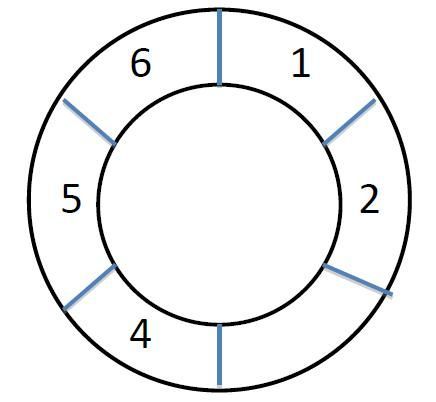HDU 4576 Robot (概率 & 期望)
Robot
Time Limit: 8000/4000 MS (Java/Others) Memory Limit: 102400/102400 K (Java/Others)
Total Submission(s): 779 Accepted Submission(s): 304
Problem Description
Michael has a telecontrol robot. One day he put the robot on a loop with n cells. The cells are numbered from 1 to n clockwise.

At first the robot is in cell 1. Then Michael uses a remote control to send m commands to the robot. A command will make the robot walk some distance. Unfortunately the direction part on the remote control is broken, so for every command the robot will chose a direction(clockwise or anticlockwise) randomly with equal possibility, and then walk w cells forward.
Michael wants to know the possibility of the robot stopping in the cell that cell number >= l and <= r after m commands.

At first the robot is in cell 1. Then Michael uses a remote control to send m commands to the robot. A command will make the robot walk some distance. Unfortunately the direction part on the remote control is broken, so for every command the robot will chose a direction(clockwise or anticlockwise) randomly with equal possibility, and then walk w cells forward.
Michael wants to know the possibility of the robot stopping in the cell that cell number >= l and <= r after m commands.
Input
There are multiple test cases.
Each test case contains several lines.
The first line contains four integers: above mentioned n(1≤n≤200) ,m(0≤m≤1,000,000),l,r(1≤l≤r≤n).
Then m lines follow, each representing a command. A command is a integer w(1≤w≤100) representing the cell length the robot will walk for this command.
The input end with n=0,m=0,l=0,r=0. You should not process this test case.
Each test case contains several lines.
The first line contains four integers: above mentioned n(1≤n≤200) ,m(0≤m≤1,000,000),l,r(1≤l≤r≤n).
Then m lines follow, each representing a command. A command is a integer w(1≤w≤100) representing the cell length the robot will walk for this command.
The input end with n=0,m=0,l=0,r=0. You should not process this test case.
Output
For each test case in the input, you should output a line with the expected possibility. Output should be round to 4 digits after decimal points.
Sample Input
3 1 1 2 1 5 2 4 4 1 2 0 0 0 0
Sample Output
0.5000 0.2500
Source
题意:给你一个n,m,l,r。n个格子围成一个圈,一个机器人从第一个格子开始,经过m个步,每个步知道走几格,但是不知道方向,问你最后在l到r之间的概率。
#include<iostream> #include<cstdio> #include<cstring> using namespace std; const int N=220; int n,m,l,r; double dp[2][N]; int main(){ //freopen("input.txt","r",stdin); while(~scanf("%d%d%d%d",&n,&m,&l,&r)){ if(n==0 && m==0 && l==0 && r==0) break; for(int i=0;i<=n;i++) dp[0][i]=0; dp[0][0]=1; int x,cur=0; while(m--){ scanf("%d",&x); for(int i=0;i<n;i++) dp[cur^1][i]=0; for(int i=0;i<n;i++){ if(dp[cur][i]==0) continue; dp[cur^1][((i-x)%n+n)%n]+=0.5*dp[cur][i]; dp[cur^1][(i+x)%n]+=0.5*dp[cur][i]; } cur^=1; } double ans=0; for(int i=l-1;i<r;i++) //注意这里的范围 ans+=dp[cur][i]; printf("%.4lf\n",ans); } return 0; }